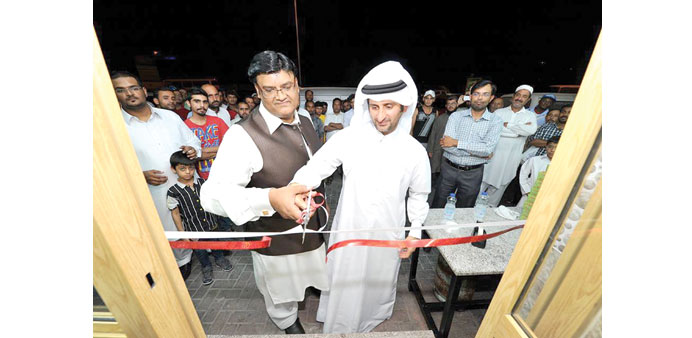SWEET MOMENT: Nabeel Ismail, left, along with his Qatari partner, Ali Sultan Fakhro, inaugurating the new shop.
The outlet at Ghanim Qadeem was inaugurated last week where guests were treated to a host of
traditional delicacies. By Umer Nangiana
Going bigger, better and ‘sweeter’, the 50-year-old traditional sweetmeat shop in Doha has made a giant leap. Abandoning its decades-old original site in the old Mushreib area behind Souq Waqif, Pakistan Sweets has opened a new upscale shop in Ghanim Qadeem, Mughlina Street near Volkswagen roundabout.
The new shop was inaugurated in a ceremony last week where a large number of guests were treated with the traditional delicacies.
Established more than 50 years ago, the outlet continues to be a huge attraction for the local communities particularly the ones from the subcontinent. The traditional Pakistani dish of puri, the deep-fried bread, and halwa (a sweet traditionally served with puris) is the best-selling food item every Eid. This year, on the first day of Eid al-Adha, they sold some 500 breakfast packs alone.
Popular among Nepali expatriates for its samosas (a baked pastry with savoury filling), the shop has introduced many new sweets and famous street food recipes from Pakistan, particularly the ones from provincial capital Lahore. “We have introduced many new delicacies with the new shop such as the Pakistani dehi bhalay, qulfi, kheer (all milk and yogurt-based dishes), dry fruit halwas, and some other recipes are under preparation,” Nabeel Ismail, the owner of the shop tells Community.
“We have been here in Doha since 1964. My father had established this business in the Mushrieb area,” he adds. Over the years, the shop has established its reputation for authentic taste in street food delicacies such as gol gappay. In a few days, lahori pura, Lahore’s street food that is made using 12 different kinds of spices, will also be available at the shop.
While most customers come from Indian, Pakistani and Nepali communities, the shop is also frequented by local Qatari community members besides the Western expatriates looking for subcontinent’s food.
“We prepare our sweets and other street food delicacies in Pakistani traditional style using the same recipes and ingredients. So it’s an authentic Pakistani taste that you would get from our sweets,” adds Nabeel.
Halwa puri, he says, is the most popular segment for them particularly on the weekends. They will soon introduce gift packing for the sweets. On public demand, they have introduced the smaller boxes for sweets.
In sweets, they have introduced new varieties of halwas which include walnut and coconut. And with winter coming, they plan to introduce some other dry fruit halwas. “We are also improving our recipes for our most famous halwa puri. We are also starting from next weekend, two of the most popular desserts from Pakistan, falooda and qulfi falooda. This will be followed by firni,” announces Nabeel.
In another six months, the owner says, they are planning to open another branch here. Long queues in front of the shop on Eid and other occasions have been a common sight for many years. People also buy sweets in bulk on such occasions.
For the people of Indian subcontinent in general and Pakistanis in particular, no festival is complete without halwa puri and channay. Now having a spacious seating capacity, the new-look shop is hoping to accommodate more dine-in customers besides widening its customer base.
During this Ramadan, Nabeel says, they sold a record number of samosas. Fridays are special at Pakistan Sweets. The owner says Fridays witness a huge rush of people starting early morning.
Besides halwa puri and channay, the bakery and sweet shop has also on offer different varieties of Pakistani sweets -- from rasmalai, gulab jaman, rus gulay, dhoodh halwa to coconut halwa, they have everything.
Nabeel’s family has been into the sweets business for more than 100 years. His father arrived in Doha in 1964. Belonging to Sialkot city in the Punjab province of Pakistan, his father personally trained the workers and chefs in preparing sweets and halwa puri.
Some of them still work in the shop. Born in Doha, Nabeel got involved in his father’s business soon after completing his school in late 80s and he has been looking after the shop, along with his two brothers, since the death of their father. Nabeel’s family is settled back in Pakistan and he visits them every six months.

